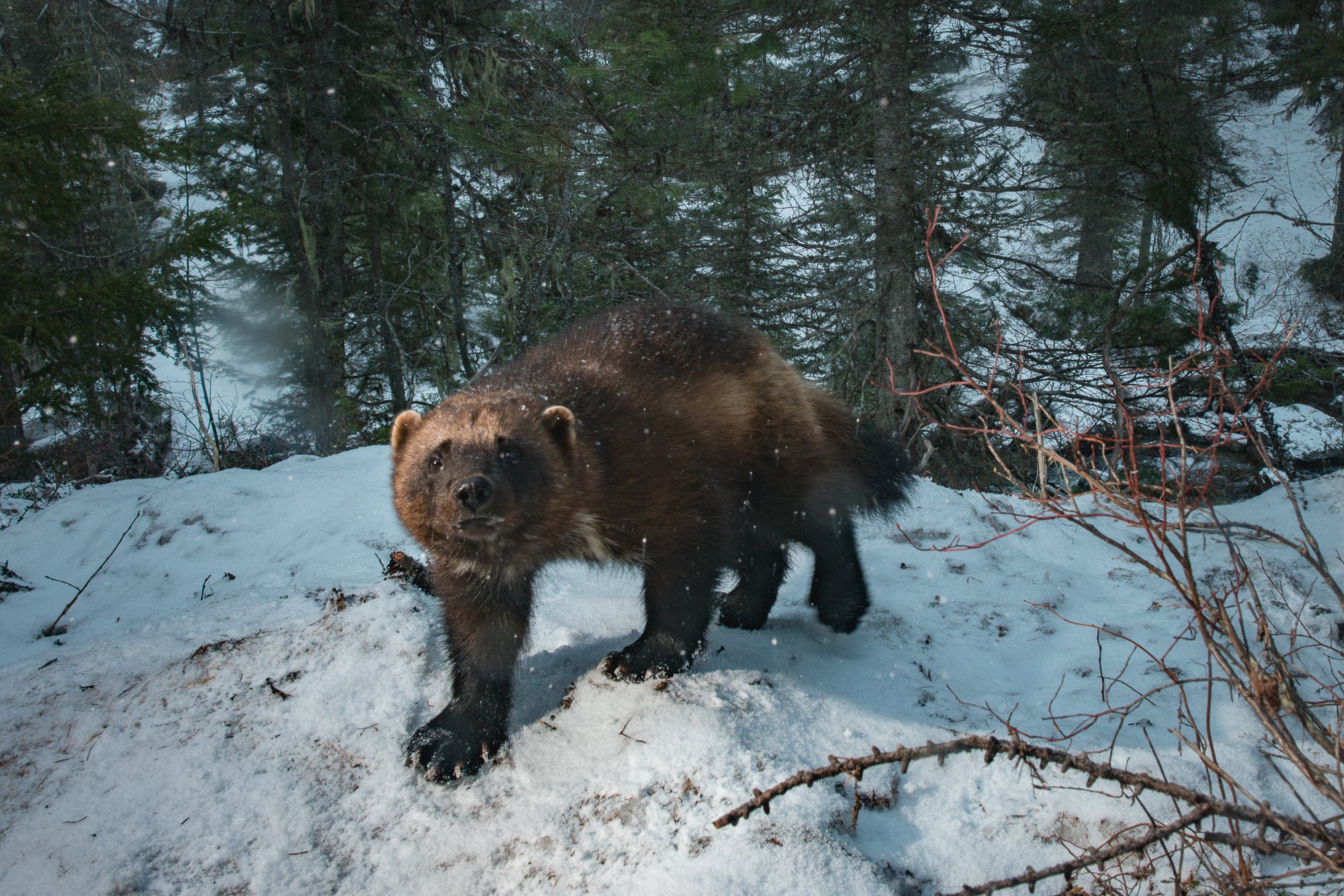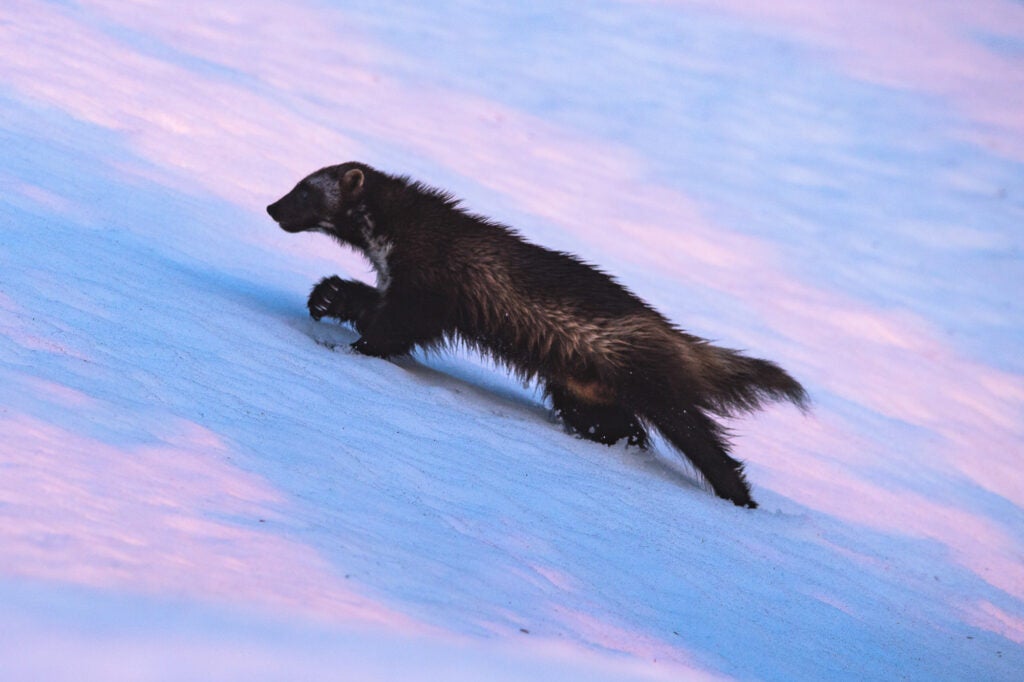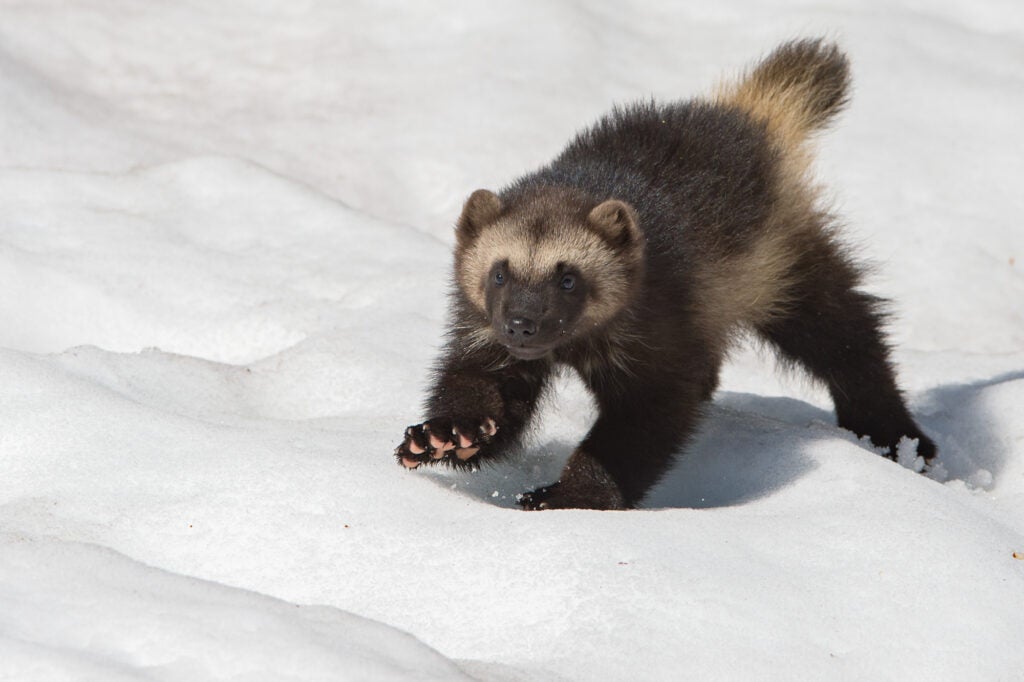Wolverines Gain Legal Protections to Ward off Extinction
The announcement comes after decades of litigation and public calls to save wolverines from development and climate change.

This page was published 2 years ago. Find the latest on Earthjustice’s work.
In superhero movies, a certain wolverine-based character is virtually undefeatable. Endurance is Wolverine’s primary quality, along with a penchant for winning scrappy fights against long odds.
Real wolverines are just as tough as their Marvel counterpart. But they’re fighting to survive against the foe of climate change, and they likely won’t win without our help.
On Nov. 29, the government pledged to give that help by listing wolverines as threatened under the federal Endangered Species Act (ESA). Wildlife experts and advocates have said for decades that ESA protections are necessary to help the cold-loving mammal survive a future of encroaching development and disappearing snowpack.
“This long-awaited decision gives the wolverine a fighting chance at survival,” said Timothy Preso, an Earthjustice attorney who represented conservation groups in the long-running legal campaign to protect the wolverine. “There is now hope for this icon of our remaining wilderness.”
Wolverines are one of roughly a million species on Earth that are threatened with extinction in the coming decades due to habitat destruction, climate change, and human-caused exploitation. Allowing these species to disappear will upend ecosystems and ultimately destabilize our own civilization — which is why Earthjustice leverages important tools like the Endangered Species Act to give them a fighting chance.

A wolverine moving through the shadows of subalpine fir lit by alpenglow. Northern Rockies. (Steven Gnam)
“A relic of the ice age”
For wolverines, the climate crisis is an existential threat. They depend on areas that maintain deep snowpack through late spring, when pregnant females dig their dens to birth and raise their young.
“Wolverines are a relic of the last ice age,” says Preso. “Their whole world is about snow and wintry landscapes that are now in short supply.”
They’re one of many species imperiled by a warming planet. Scientists predict that climate change will soon become the biggest threat to biodiversity. The two crises are interlinked: climate change imperils species, and the destruction of essential ecosystems also reduces the planet’s natural defenses for withstanding climate impacts.
The melting of wolverines’ habitat is particularly dire because they can’t downsize their living space requirements. Wolverines are notorious introverts with a lot of energy: They travel fast, solo, and incredibly far, speeding across open tundra for many miles. Though their name may mean “little wolf,” they are actually the largest member of the weasel family. They do not live in packs, and they require miles of interconnected land to survive.
Few people get the opportunity to interact with a wolverine. Even experts have rarely seen one in the wild, as traveling to the wolverine’s glacial alpine habitat is a harsh journey.
Dave Werntz began advocating for wolverines in the early 2000s with the wildlife restoration group Conservation Northwest. The more he studied them, the more he appreciated their ability to thrive in remote environments (he hopes to see one someday).
“Looking into wolverines’ natural history, they are extremely tough and rugged,” says Werntz. “They’re matched only by the environment they live in, the backcountry mountains of the West. They are robust and strong; we just need to allow them a chance to survive.”

Earthjustice Biodiversity Defense Program Managing Attorney Tim Preso. (Doug Loneman for Earthjustice)
Taking the government to court
The government’s recent announcement of new wolverine protections culminates two decades of legal back-and-forth, passionate public campaigns, and opposition from pro-trapping states.
In 2000, Earthjustice represented conservation groups who petitioned the U.S. Fish and Wildlife Service to protect wolverines. By then, wolverines had been trapped and hunted nearly to extinction. Scientists estimate that barely 300 individual wolverines are scattered across Idaho, Montana, Washington, Wyoming, and northeast Oregon.
Instead of heeding the science, multiple administrations delayed making the call to protect wolverines, wary of wading into the political minefield of state wildlife management rights and trapping lobbies.
Earthjustice brought the government to court again and again — and won every time, either through judicial rulings or favorable settlement agreements. In the words of one baffled judge, “If there is one thing required of the Service under the ESA, it is to take action at the earliest possible, defensible point in time to protect against the loss of biodiversity within our reach as a nation. For the wolverine, that time is now.”
As Preso and Earthjustice’s clients wrangled with the government, the wolverine fought to survive a steadily heating planet.

A wild wolverine kit playing on the snow outside of a rendezvous site. Northern Rockies. (Steven Gnam)
Fighting for the future
In 2020, the Trump administration again denied listing wolverines under the Endangered Species Act. Earthjustice represented conservation groups who challenged the decision, and a court (once again) sided with us, forcing the Fish and Wildlife Service to go back to the drawing board for a science-backed assessment. This week, the agency finally announced the protections that advocates have spent over 25 years calling for.
“The court’s decision today gives a boost to struggling wolverines across the west,” said Dave Werntz, senior science and conservation director at Conservation Northwest. “The future for wolverines in the North Cascades and elsewhere is now much brighter.”
The ESA protections will open the door to important recovery steps, including designating critical habitats, coordinating resources between federal and state agencies, and reintroducing wolverines to Colorado — one of the last states that holds spring snowpack late into the spring.
After two decades of battling in the courts on behalf of wolverines, Preso is hopeful that they’ll now have a fighting chance in a hotter world.
Earthjustice uses the power of the law to protect biodiversity — and we represent our clients for free, because no creature should have to pay for its right to a healthy environment. Our work depends on supporters like you.
The Biodiversity Defense Program fights to reshape our relationship to lands, water, and wildlife everywhere by confronting the major drivers of the decline in nature, including habitat destruction and over-exploitation of wildlife.